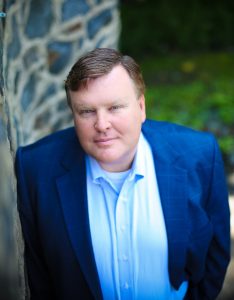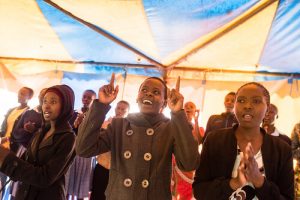Every non-profit has a vested interest in understanding the ‘why’ of philanthropic efforts. As members of the non-profit Neema Project, we tapped into this psychology by interviewing our title sponsor after this year’s major giving campaign.
Normal fundraisers allow a sponsor uninterrupted face time with other attendees, but Covid-19 has shifted this year’s campaigns to virtual events with pre-recorded spotlights. This made the guaranteed recognition more ambiguous for our title sponsor adding to the intrigue behind the psychology of ‘why.’

Wayne Wagner, photo courtesy of Vizionary Wealth.
Wayne Wagner, the president of Vizionary Wealth Management in Wilmington, DE, admits that Covid-19 has changed philanthropic efforts.
‘I think people are looking closer to home. I think our worlds and focus got smaller when we all got locked down. We see the person next door, down the street, or in our town a bit more clearly when we slow down… So I think that affects where dollars get put charitably. When we more readily see the need down the street, it can be harder to think about reaching across oceans.’
However, he acknowledges that focusing his philanthropic efforts towards international organisations like ours is a priority for him. ‘We are looking for ‘needle moving’ organisations to partner with – specifically organisations whose work and impact can dramatically improve the lives of the people they are serving. We look at both the work itself and the ‘system’ or business model used to do the work.’
One way to measure success, Wayne says is, ‘Low overhead relative to ‘money on the ground.’ Running a lean ship is important to me. [When] we are spending a high percentage of the funds raised on the process of raising the funds, I wonder how much excellent work is being done…? I would rather the work be the work and we spend as little as we can get by on in the process of fundraising. That process and expenditure is a necessary evil in my book, and I prefer we do more of one and less of the other.’
Perhaps an organisation can do this by utilising those who can’t give. This is something Wayne takes into consideration. ‘A volunteer base helps in a number of areas – volunteers defray some of the costs associated with the work itself and it engages a broader scope of people to the task at hand. Not everyone can afford to donate money, but many can donate time. How does the organisation engage this dynamic to increase the impact they are able to make?’
‘I think people are looking closer to home [after Covid-19]. I think our worlds and focus got smaller when we all got locked down.’
While volunteers may be personally invested in the organisation, Wayne likes to see this personal investment extend to the organisation’s leadership. Wayne says that ‘getting to know the people in leadership of any organisation is key’ when choosing which non-profits to invest in. ‘Hearing their passion, heart, and personal story of investment is key… I want a personal connection to the organisation, hearing the history, the ways the organisation has and is adapting to increase its impact, and the degree to which that impact can change lives.’

Image courtesy of the Neema Project.
And the type of impact is important. ‘I look for high impact work… This is not putting a shirt on a child today that will be useless by next month or providing a meal that will be digested today and the person will be hungry again tomorrow. It’s not that those efforts aren’t important, there is a place for them. But I prefer an organisation that can shift the tide for a family tree for potentially decades to come.’
Although personal, Wagner’s views invite consideration for non-profits and philanthropists alike. What is the nature of the impact an organisation’s work is having? How is that organisation using not only its monetary resources, but non-monetary resources? And lastly, is the leadership accessible and personally invested in the work it’s doing? While the answers to these questions will vary in importance between individuals and organisations, it’s worth listening to one another as we consider the psychology behind each of our ‘whys.’ Listening invites cooperation, cooperation invites action, and action will make the world a better place.
Greg Lusby is the Tribe Administrator for Neema Project in Kitale, Kenya. Emily Nelson is the Communication and Marketing Associate for Neema Project in Kitale, Kenya.







Comments (1)
This really touched me very much look like I’m seeing my daughter Neema dream and l would like to know more about Neema project too